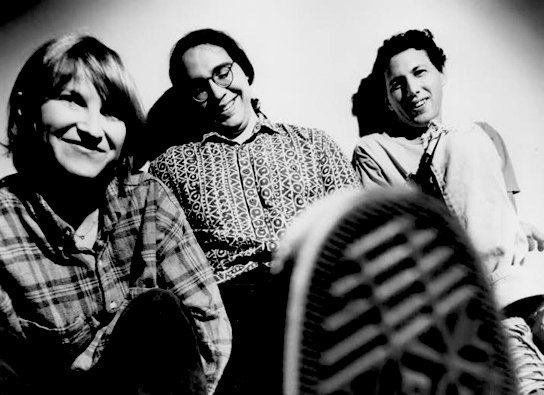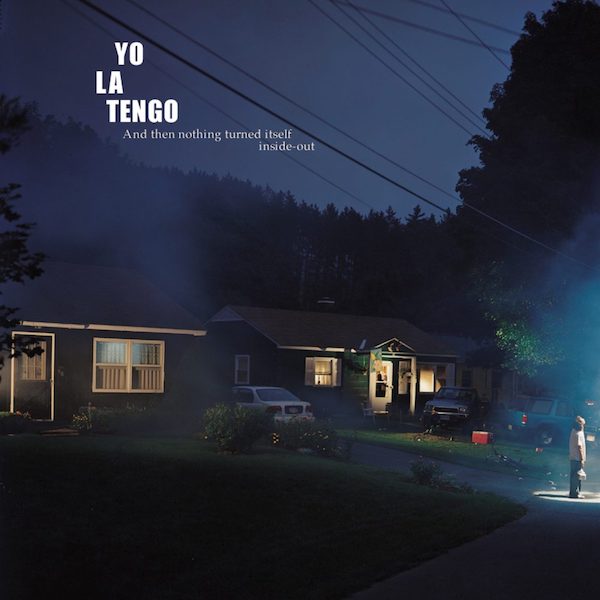Pynchon Music: Yo La Tengo
Ira Kaplan and Georgia Hubley play twanging country, trance electro-drone, and distortion-soaked pop, suggesting a Bergman film set in a Hoboken record store: abstract and intimate, sweetly whispering, raging like a distant thunderstorm.
—Chris Norris, “SPIN” Magazine
Yo La Tengo (1984–present)
Formed in Hoboken in 1984, Yo La Tengo have become a veritable New York institution, elder statesmen of the indie-rock landscape with few remaining peers: they were even tapped to portray the Velvet Underground in the film I Shot Any Warhol! (Perhaps Luna was busy?) Whether pioneering ethereal dream pop, backing up Robyn Hitchcock for a one-off gig, or improvising a soundtrack to a film about octopuses fucking, Yo La Tengo has remained wonderfully amorphous and inventive. Yo La Tengo may not be a jazz combo, but they think like jazz musicians. They constantly re-define their boundaries, stretch their songs into new shapes, and restructure their old material into new forms. As passionate fans of music themselves, Yo La Tengo choose from a wildly diverse selection of covers (Richard Thompson, Wire, John Cale, The Dead C, The Normal, Flamin’ Groovies, and the Kinks comprise a small sampling) and make the songs their own, much like Ornette Coleman and Don Cherry deconstructing “Embraceable You.” Like most great artists, they never regurgitate derivatively, but synthesize their disparate influences into music that sounds only like Yo La Tengo.
Their ninth studio album, And Then Nothing Turned Itself Inside-Out, contains an interesting reference to Thomas Pynchon’s novel The Crying of Lot 49. Visitor “Seth” writes:
Pop culture references usually abound on Yo La Tengo track listings, and continue here. “Last Days of Disco” is a modal pop song, Ira Kaplan reminiscing about a distant first meeting, his vocals and guitar cruising lightly over Georgia Hubley and James McNew’s polyrhythmic underpinning. “The Crying of Lot G,” title suggestive of notoriously Byzantine author Thomas Pynchon, is ironically the most lyrically naked and literal song on the album. It’s also the most direct paean to the internal ebb and flow of love they’ve ever written, with Kaplan speak-singing “you say all we do is fight, and I think, gee, I don’t know if that’s true…” over an ambient 50’s-style weeper. A cover of disco hit-maker George McRae’s “You Can Have It All” follows, and features Hubley sleepily declaring her heart over Kaplan’a AM-radio ba-ba-da’s ping-ponging in the background and funky soul string accents (courtesy of engineer David Henry and his cello). The band’s approach to disco cheese is loving and un-ironic and raises the song above its station in pop’s hierarchy; it could be a Yo La Tengo song, whereas the next song, “Tears Are In Your Eyes” sounds achingly classic enough to be a cover of a lost country ballad.
Over at the Pynchon reddit, “BelleIsleYachtClub” has this to say:
…this song is from the 2000 album And Then Nothing Turned Itself Inside-Out which is an example of the Venn diagram-crossover between Pynchon fans and The Simpsons fans (Pynchon himself being in this latter fandom) with the original temp titles for all the demo tracks for the album sharing a name with a film or tv project that character Troy McClure had acted in. The only song to hold on to its temporary name was “Let’s Save Tony Orlando’s House,” named after one of Troy McClure’s more prestigious charitable television fundraisers.
Lyrics
“The Crying of Lot G”
What did I miss here?
What can’t you take anymore?
Expecting a whisper,
I heard the slam of a door
You say that all we ever do is fight
Gee, I don’t know that that’s true.
then I wonder, am I right?
or is that part of our problem?
Maybe I’m out of my mind.
Maybe I’m blocking out the truth.
But it seems like just a little thing,
like you don’t want to listen,
and I can’t shut up.
You don’t have to smile at me.
we don’t have to talk.
all that I ask is you stop,
and remember, it isn’t always this way.
You have the problem,
it comes with our private jokes.
when you’re in a fury,
laughter gets stuck in my throat
Sometimes I wonder why we have so much trouble
cheering each other up sometimes,
when one or the other of us is down.
Instead it’s like, when you’re in a bad mood
I look at you and I say, maybe she’s knows something
I don’t know, maybe I should be upset.
You don’t have to smile at me
We don’t have to talk.
All that I ask is you stop
and remember, it isn’t always this way.
The way that I feel
when you laugh
is like laughing.
The way that I feel
when you cry
is so bad.
What can’t you take anymore?
Expecting a whisper,
I heard the slam of a door
You say that all we ever do is fight
Gee, I don’t know that that’s true.
then I wonder, am I right?
or is that part of our problem?
Maybe I’m out of my mind.
Maybe I’m blocking out the truth.
But it seems like just a little thing,
like you don’t want to listen,
and I can’t shut up.
You don’t have to smile at me.
we don’t have to talk.
all that I ask is you stop,
and remember, it isn’t always this way.
You have the problem,
it comes with our private jokes.
when you’re in a fury,
laughter gets stuck in my throat
Sometimes I wonder why we have so much trouble
cheering each other up sometimes,
when one or the other of us is down.
Instead it’s like, when you’re in a bad mood
I look at you and I say, maybe she’s knows something
I don’t know, maybe I should be upset.
You don’t have to smile at me
We don’t have to talk.
All that I ask is you stop
and remember, it isn’t always this way.
The way that I feel
when you laugh
is like laughing.
The way that I feel
when you cry
is so bad.
Additional Information
Track Listing
1. Everyday (6:32)
2. Our Way to Fall (4:18)
3. Saturday (4:18)
4. Let’s Save Tony Orlando’s House (4:59)
5. Last Days of Disco (6:28)
6. The Crying of Lot G (4:45)
7. You Can Have It All (4:37)
8. Tears Are In Your Eyes (4:35)
9. Cherry Chapstick (6:12)
10. From Black to Blue (4:47)
11. Madeline (3:37)
12. Tired Hippo (4:46)
13. Night Falls On Hoboken (17:42)
2. Our Way to Fall (4:18)
3. Saturday (4:18)
4. Let’s Save Tony Orlando’s House (4:59)
5. Last Days of Disco (6:28)
6. The Crying of Lot G (4:45)
7. You Can Have It All (4:37)
8. Tears Are In Your Eyes (4:35)
9. Cherry Chapstick (6:12)
10. From Black to Blue (4:47)
11. Madeline (3:37)
12. Tired Hippo (4:46)
13. Night Falls On Hoboken (17:42)
Musicians
Ira Kaplan—lead vocals and backing vocals, guitar, keyboard.
Georgia Hubley—drums, lead and backing vocals, percussion, keyboard.
James McNew—bass, guitar, percussion, keyboard, lead and backing vocals.
David Henry—cello (7).
Susie Ibarra—percussion (1, 3).
Ira Kaplan—lead vocals and backing vocals, guitar, keyboard.
Georgia Hubley—drums, lead and backing vocals, percussion, keyboard.
James McNew—bass, guitar, percussion, keyboard, lead and backing vocals.
David Henry—cello (7).
Susie Ibarra—percussion (1, 3).
Listen to “The Crying of Lot G” — Listen to “The Crying of Lot G” on YouTube.
Yo La Tengo Homepage — The official Web site of Yo La Tengo.
Yo La Tengo Facebook Page — Yo La Tengo maintains a Facebook page.
Yo La Tengo Bandcamp Page — You can browse, hear, and purchase Yo La Tengo music on Bandcamp.
Yo La Tengo Wikipedia Page — You can read more about Yo La Tengo on Wikipedia.
Yo La Tengo Discog Page — Collects album covers and information on Yo La Tengo releases.
Pitchfork Review — Pitchfork, 9 February 2000. Ryan Schreiber’s review of And Then Nothing Turned Itself Inside-Out.
Books
Avery, 2021
In this informative history of Yo La Tengo, Jarnow quips that “The Crying of Lot G” is “Thomas Pynchon by way of Newark International airport.”
Pynchon on Record
Return to the main music page
Authors: Dr Larry Daw & Allen B. Ruch
Last Modified: 31 August 2024
Main Pynchon Page: Spermatikos Logos
Contact: quail(at)shipwrecklibrary(dot)com
Last Modified: 31 August 2024
Main Pynchon Page: Spermatikos Logos
Contact: quail(at)shipwrecklibrary(dot)com




